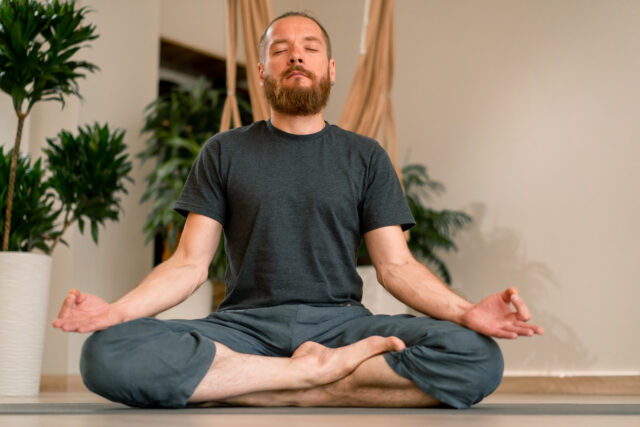Self-respect comes down to the way you treat and talk to and about yourself.

Having it means you honour your values, needs, and desires, and you demand that other people show you the same consideration you show yourself. It’s a quality you re-cement every day, and allows you to protect yourself from people with less than noble intentions, bad situations, and the things in life that simply don’t serve you. Sadly, some people lack it, but if you do these things, you’ve got self-respect in spades.
1. You set and honour your boundaries.

Saying “no” when you need to and standing firm on your limits is a clear sign of self-respect. Boundaries protect your energy and ensure people don’t take advantage of your kindness. By consistently sticking to them, you show yourself that your comfort and well-being matter. Boundaries also help you build healthier, more balanced relationships.
2. You fuel your body with intention.

Respecting yourself means feeding your body in ways that make you feel good—whether it’s a balanced meal or treating yourself to a favourite snack. It’s not about perfection, but about caring for your physical health with kindness and balance. Even small choices, like staying hydrated or eating at regular intervals, show respect for your body’s needs.
3. You take time to rest and recharge.

Rest isn’t a luxury; it’s essential. Making time for sleep, relaxation, or even quiet moments shows you value your mental and physical health. Skipping rest may feel productive, but it often leads to burnout—something a self-respecting person actively avoids. Even short breaks throughout the day can make a significant difference in your energy levels and overall mindset.
4. You speak kindly to yourself.

Negative self-talk can be destructive, so countering it with encouragement and patience is a powerful sign of self-respect. When you treat yourself as you would a close friend, you build a healthier and more positive relationship with yourself. It’s also a habit that helps you build resilience, making it easier to bounce back from setbacks.
5. You make time for things you enjoy.

Prioritising hobbies or activities that bring you joy reinforces that your happiness matters. Whether it’s painting, playing a sport, or reading a book, carving out time for what lights you up is a daily act of self-care and respect. These moments of joy often recharge your spirit and keep life feeling fulfilling, even on busy days.
6. You move your body in ways you find pleasing.

Exercise doesn’t have to mean gruelling workouts—it’s about moving in ways that feel good to you. Walking, dancing, yoga, or even stretching show that you care about your physical well-being. Making movement a regular part of your day keeps you energised and connected to yourself. It’s also a chance to relieve stress and boost your mood naturally.
7. You focus on progress, not perfection.

Respecting yourself means letting go of the idea that you need to be perfect. Instead, you celebrate small wins and improvements. Changing the way you approach progress and growth reduces unnecessary pressure and helps you enjoy the journey rather than stressing over the destination. Learning to laugh at your mistakes also encourages self-compassion and keeps the process a bit more laid-back.
8. You practice gratitude for what you have.

Taking a moment to appreciate the good things in your life, no matter how small, reinforces a positive outlook. Gratitude is a simple yet powerful way to remind yourself that you’re deserving of all the good in your life. Writing down a few things you’re thankful for each day can deepen this practice and shift your focus from what’s lacking to what’s abundant.
9. You don’t shy away from tough emotions.

Instead of avoiding sadness, frustration, or anger, you allow yourself to feel and process them. Respecting yourself means recognising that all emotions are valid and part of being human. Facing these feelings helps you grow and move forward with clarity. Suppressing emotions often leads to more stress, but acknowledging them creates space for healing and self-awareness.
10. You prioritise your needs without guilt.

Putting yourself first isn’t selfish—it’s necessary. Taking care of your needs, whether physical, emotional, or social, ensures you’re in the best place to support other people when they’re struggling. A self-respecting person knows that prioritising themselves benefits everyone in the long run. Over time, doing so strengthens your ability to maintain balance and avoid burnout.
11. You manage your time wisely.

Respecting your time is respecting yourself. Avoiding distractions, setting priorities, and dedicating time to what matters most show that you value your days. That doesn’t mean cramming your schedule but using your time intentionally to balance productivity and relaxation. Planning your day, even loosely, ensures you can accomplish what’s important without feeling overwhelmed.
12. You invest in your personal growth.

Whether it’s reading, learning a new skill, or taking a step toward a goal, prioritising growth shows you believe in your potential. Small, consistent actions to better yourself reflect deep respect for who you are and who you’re becoming. Growth doesn’t have to be grand—it’s the little, everyday steps that create lasting change over time.
13. You let go of what you can’t control.

Resisting the urge to micromanage everything in life is a major sign of self-respect. Accepting that some things are out of your hands allows you to focus on what you can control. It’s a daily reminder to prioritise peace over unnecessary worry. Letting go also frees up mental space for more meaningful and enjoyable pursuits.




